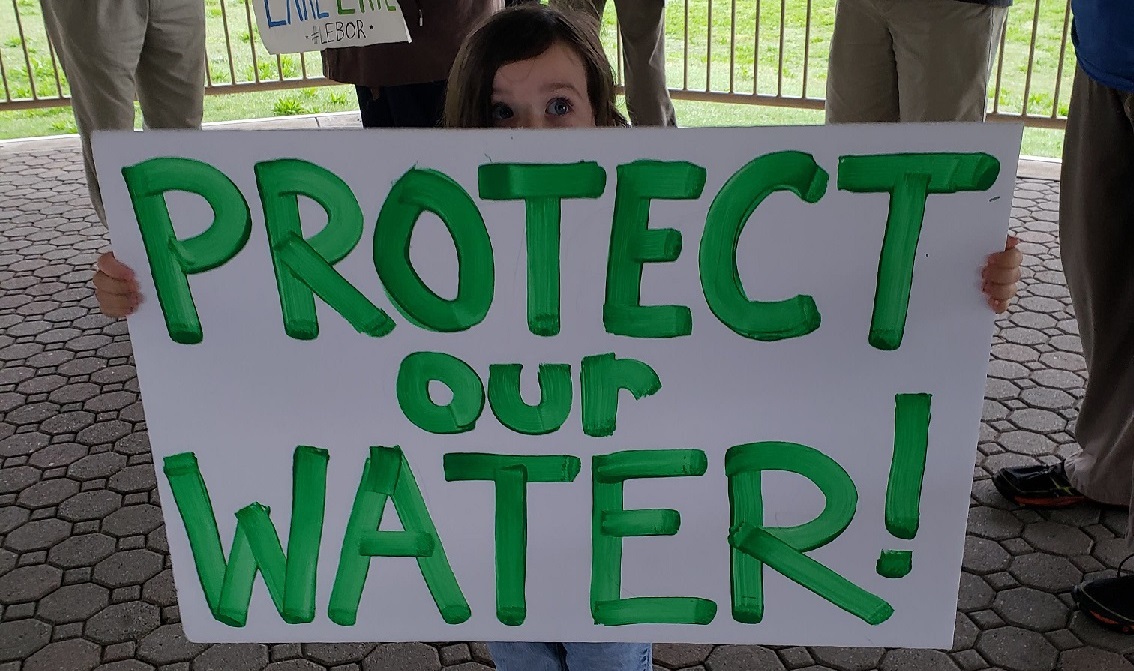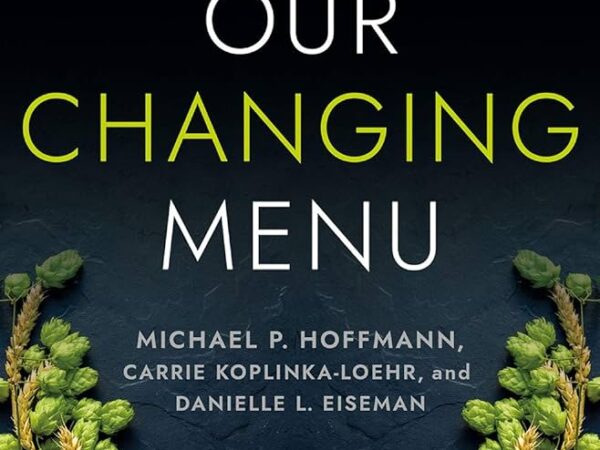
Legal questions about how the Lake Erie Bill of Rights would work surround the Toledo election
If Toledo voters approve the Lake Erie Bill of Rights proposal on their Feb. 26 ballots, how it will change environmental law and policy won’t be immediately be known.
The initiative, led by a citizens’ group, is unique in Ohio, if not the United States, and even seasoned environmental attorneys are not quite sure exactly what would, could or should happen if it garners a majority in the special election.
Great Lakes Now is bringing a variety of perspectives about the issue with these extended conversations:
Making Waves at the Ballot Box: Effort to pass Lake Erie Bill of Rights started with citizens concerned about drinking water crisis
Targeting the Farms: Ohio agriculture industry concerned about what happens if voters pass the Lake Erie Bill of Rights
Threat to Business: Ohio Chamber members would be harmed by Lake Erie Bill of Rights
Nick Schroeck, director of clinical programs at the University of Detroit Mercy School of Law, spoke with Great Lakes Now’s Sandra Svoboda about some of the legal questions and a few of the possible answers.
Here is an edited version of their conversation.
![]() Great Lakes Now: How is the Lake Erie-related action like other citizen-initiated actions elsewhere where people are hoping to protect nature by something outside of the “normal” policymaking process?
Great Lakes Now: How is the Lake Erie-related action like other citizen-initiated actions elsewhere where people are hoping to protect nature by something outside of the “normal” policymaking process?

Nick Schroeck: There’s a movement globally, and it’s primarily indigenous groups that have moving to recognize natural resources have their own legal standing, their own legal rights.
![]() If voters approve this on Feb. 26, what would happen? How would Lake Erie be affected?
If voters approve this on Feb. 26, what would happen? How would Lake Erie be affected?
 With the Lake Erie Bill of Rights, the idea is that you give Lake Erie the resource its own legal agency. So basically Lake Erie could “defend itself” against pollution or against degradation. Currently we don’t give legal standing in this country to trees, lakes, any natural resource or inanimate object. We give legal standing to people and citizens meaning that the way you get into court to challenge something or to raise legal claim is by being a person who has standing.
With the Lake Erie Bill of Rights, the idea is that you give Lake Erie the resource its own legal agency. So basically Lake Erie could “defend itself” against pollution or against degradation. Currently we don’t give legal standing in this country to trees, lakes, any natural resource or inanimate object. We give legal standing to people and citizens meaning that the way you get into court to challenge something or to raise legal claim is by being a person who has standing.
![]() So here you’re allowing a resource to be protected for its own sake, to defend itself through the legal system rather than having a human stand in its place?
So here you’re allowing a resource to be protected for its own sake, to defend itself through the legal system rather than having a human stand in its place?
 First of all, a lot of this will have to be sorted out because it’s something new. It’s something that would be unique in the United States, as far as I’m aware. Natural resources have been given legal rights, again it’s typically from indigenous groups, who have had a historical, spiritual connection to a body of water.
First of all, a lot of this will have to be sorted out because it’s something new. It’s something that would be unique in the United States, as far as I’m aware. Natural resources have been given legal rights, again it’s typically from indigenous groups, who have had a historical, spiritual connection to a body of water.
What’s interesting about this ballot proposal is that it’s from concern citizens who are seeking to protect and restore Lake Erie and that would be somewhat of a novel thing here in this country.
A lot of this still has to be sorted out. It’s hard to speculate how it would play out if Lake Erie was to bring an enforcement action against a CAFO. There are a lot of steps that will have to be figured out before we get to that point.
![]() How unique is this in the Great Lakes region?
How unique is this in the Great Lakes region?
 What is interesting about it is that it’s a new approach. The people who are proponents of the initiative, they’re really trying to push the envelope on protecting Lake Erie because they’re frustrated because of how many years it has been since the Clean Water Act. Since the 1970s, we’ve made some progress, but there’s still all of these significant threats to Lake Erie and significant degradation. That’s largely because our laws have not appropriately addressed pollution from non-point sources, agricultural run off.
What is interesting about it is that it’s a new approach. The people who are proponents of the initiative, they’re really trying to push the envelope on protecting Lake Erie because they’re frustrated because of how many years it has been since the Clean Water Act. Since the 1970s, we’ve made some progress, but there’s still all of these significant threats to Lake Erie and significant degradation. That’s largely because our laws have not appropriately addressed pollution from non-point sources, agricultural run off.
People are frustrated, and they’re looking for a different approach like this one that’s novel.
![]() But can this really work? How would it be implemented, so to speak?
But can this really work? How would it be implemented, so to speak?
 It’s a city of Toledo resolution so they would have to figure it out somehow. You potentially would have a person designated like an ombudsman. I don’t know if they’ve actually contemplated how litigation would actually be commenced on behalf of the lake. I won’t speculate because I don’t know.
It’s a city of Toledo resolution so they would have to figure it out somehow. You potentially would have a person designated like an ombudsman. I don’t know if they’ve actually contemplated how litigation would actually be commenced on behalf of the lake. I won’t speculate because I don’t know.
The challenges are our courts would not be used to these types of claims, so I think you’d be facing skeptical judges if you were to bring litigation. That’s one practice point any time you have new or novel legal approaches, you’re likely to face skepticism or some entrenched, “this is the way we do things,” kind of pushback. You would also have to prove the harm, prove where it’s coming from so you would still have those causation issues that we sometimes face, where a defendant would say, “It’s not my issue that’s causing harm, it’s the other guy.” You would have to show that the harm was due to that particular farmer’s activity. It could be done, but it would have to be proved.
![]() So stepping back from what the Bill of Rights represents and thinking about how it would work, that seems complicated and full of uncertainty right now?
So stepping back from what the Bill of Rights represents and thinking about how it would work, that seems complicated and full of uncertainty right now?
 There’s likely to be some constitutional challenge to this ballot initiative if it passes. You’re likely to see lawsuits if this is even considered under the state of Ohio’s constitution and the U.S. Constitution. Can we liken personhood to a resource? It’s an interesting question.
There’s likely to be some constitutional challenge to this ballot initiative if it passes. You’re likely to see lawsuits if this is even considered under the state of Ohio’s constitution and the U.S. Constitution. Can we liken personhood to a resource? It’s an interesting question.
If this passes, you’ll likely have litigation over whether it’s a valid exercise of City of Toledo municipal authority. I think that’s where it would get really interesting.
![]() And Lake Erie is located between the United States and Canada, so how would its geography complicate this Bill of Rights being activated?
And Lake Erie is located between the United States and Canada, so how would its geography complicate this Bill of Rights being activated?
 You’re also got multiple states and two countries that have territory in and on Lake Erie. You have international agreements that deal with the management of Lake Erie. If someone in Toledo were to try and force action that was contrary to the International Joint Commission, which is the group that was created out of our Boundary Water Treaty with Canada, that likely would not fly. I don’t see any way it would, but it could potentially lead to some really interesting litigation around the Great Lakes Basin.
You’re also got multiple states and two countries that have territory in and on Lake Erie. You have international agreements that deal with the management of Lake Erie. If someone in Toledo were to try and force action that was contrary to the International Joint Commission, which is the group that was created out of our Boundary Water Treaty with Canada, that likely would not fly. I don’t see any way it would, but it could potentially lead to some really interesting litigation around the Great Lakes Basin.
![]() So you could have someone in Toledo saying potentially harmful activity on Lake Superior or in Lake Michigan was flowing down to Lake Erie and then under this proposal they could force legal action against the entity they think is polluting?
So you could have someone in Toledo saying potentially harmful activity on Lake Superior or in Lake Michigan was flowing down to Lake Erie and then under this proposal they could force legal action against the entity they think is polluting?
 You can come up with some hypotheticals that are pretty dramatic. I think there would be some questions about where does the legal authority of the City of Toledo and the residents begins and ends.
You can come up with some hypotheticals that are pretty dramatic. I think there would be some questions about where does the legal authority of the City of Toledo and the residents begins and ends.
![]() Could this be less about the real legal processes that could occur and more about raising the profile of water issues, water security, drinking water safety?
Could this be less about the real legal processes that could occur and more about raising the profile of water issues, water security, drinking water safety?
 To the end that the Lake Erie Bill of Rights draws more attention to the significant environmental challenges faced by Lake Erie, I think that’s a good thing regardless of how this is ultimately decided by the voters, and if it’s implemented, the fact that there’s attention that Lake Erie is still under threat from pollution, that’s a good thing. Anytime you have a citizens’ initiative that’s trying to draw attention to an important issue, that can be a good thing.
To the end that the Lake Erie Bill of Rights draws more attention to the significant environmental challenges faced by Lake Erie, I think that’s a good thing regardless of how this is ultimately decided by the voters, and if it’s implemented, the fact that there’s attention that Lake Erie is still under threat from pollution, that’s a good thing. Anytime you have a citizens’ initiative that’s trying to draw attention to an important issue, that can be a good thing.
Featured Image: Amelia Jankowski holds a sign, Photo by Toledoans for Safe Water via James Proffitt




